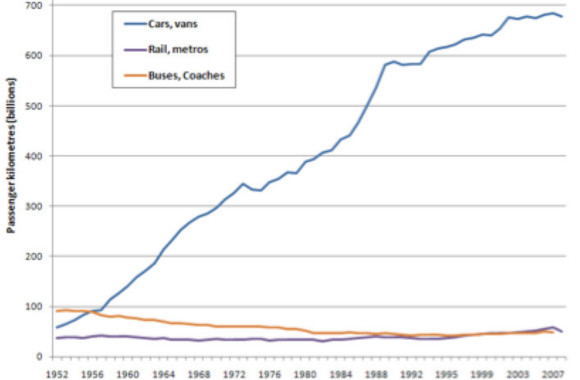A guest post by Duncan Smith, contributing to the second Ecological Urbanism discussion hosted by Annick Labeca, Taneha Bacchin, DPR-Barcelona and single-blogs.
----
Connectivity and Sustainability in 21st Century Cities
Transportation is only one domain of urban sustainability, yet it is a critical aspect as connectivity is (arguably) the fundamental social and economic purpose of cities. Furthermore transportation has widespread consequences for urban quality of life, and of course for energy use and carbon emissions. This discussion is a reflection on a talk given by Prof Michael Wegener at CASA UCL.
The history of urbanism is one of massively increasing mobility, both within urban regions and between them in terms of travel, trade and globalisation. The graph below illustrates the dramatic change in vehicle miles over the last fifty years in the UK. This has been enabled by greatly reduced costs of motoring, through unprecedented fossil fuel exploitation and growth in the global car industry. Yet this change is fundamentally a result of social behaviour, that is the desire of people to maximise their opportunities and choice by using increased mobility to live, work, shop and socialise over greater and greater distances.

Figure taken from Department for Transport, 2009b / UK total travel distance by mode 1952-2008.
Wegener argues this era of increased mobility has ended. The threat of anthropogenic climate change compels us to massively reduce transportation carbon emissions, and commitments made for example at the EU level to reduce emissions by 80% by 2050 require massively reduced motorised travel and subsequently mobility. The second strand to this argument comes from the finite nature of oil supplies and the inevitable price increases as global supplies dwindle. Unfortunately these demands are in sharp contrast to major economic trends of increased globalisation, with greater interaction between cities, and specialisation with intensive spatially segregated economic functions requiring greater travel. Current urban form solutions to this potential conflict revolve around ideas of ‘networked’ and ‘polycentric’ cities, with multiple nodes closely integrated through public and active transport links.
Just as modernism fetishised speed and motorisation, technological fixes to urban transportation sustainability are constantly promoted and are always just around the corner. Amazing innovations in electric drive train vehicles can remove local pollution from cities, but will not overcome energy and carbon emission challenges. A more radical overhaul of the automobile is required. The humble pedestrian, bicycle and the tram/streetcar currently remain the best tools we have for providing connectivity and liveability, and the most successful cities for sustainable travel (e.g. Copenhagen, Barcelona, Amsterdam, Munich..) prioritise these modes. Progress relies on planning and design that enables connectivity through less energy intensive means, as well as a political consensus to tax fossil fuels, which research shows is the powerful means of influencing travel behaviour.
----
Duncan Smith is a researcher in GIS and urban geography at CASA UCL, completing a PhD on the topic of polycentric urban form and sustainable development. He also works as a research fellow at the Greater London Authority Economics Unit.
Tidak ada komentar:
Posting Komentar